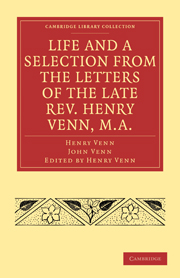Book contents
- Frontmatter
- ADVERTISEMENT
- PREFACE BY THE EDITOR
- Contents
- MEMOIR BY THE REV. JOHN VENN
- CORRESPONDENCE
- SECTION I LETTERS WRITTEN FROM HIS FIRST APPOINTMENT TO HUDDERSFIELD, TILL HIS REMOVAL FROM IT
- SECTION II LETTERS WRITTEN FROM HIS ACCEPTANCE OF YELLING, TO THE COMMENCEMENT OF HIS CORRESPONDENCE WITH HIS SON
- SECTION III LETTERS WRITTEN TO HIS CHILDREN AND DIFFERENT FRIENDS, FROM THE YEAR 1777 TO THE TIME OF HIS SON'S ORDINATION
- SECTION IV LETTERS WRITTEN FROM THE TIME OF HIS SON'S ORDINATION, TO THE YEAR 1788
- SECTION V LETTERS WRITTEN FROM THE YEAR 1788, TO THE CLOSE OF HIS CORRESPONDENCE
SECTION III - LETTERS WRITTEN TO HIS CHILDREN AND DIFFERENT FRIENDS, FROM THE YEAR 1777 TO THE TIME OF HIS SON'S ORDINATION
Published online by Cambridge University Press: 05 August 2011
- Frontmatter
- ADVERTISEMENT
- PREFACE BY THE EDITOR
- Contents
- MEMOIR BY THE REV. JOHN VENN
- CORRESPONDENCE
- SECTION I LETTERS WRITTEN FROM HIS FIRST APPOINTMENT TO HUDDERSFIELD, TILL HIS REMOVAL FROM IT
- SECTION II LETTERS WRITTEN FROM HIS ACCEPTANCE OF YELLING, TO THE COMMENCEMENT OF HIS CORRESPONDENCE WITH HIS SON
- SECTION III LETTERS WRITTEN TO HIS CHILDREN AND DIFFERENT FRIENDS, FROM THE YEAR 1777 TO THE TIME OF HIS SON'S ORDINATION
- SECTION IV LETTERS WRITTEN FROM THE TIME OF HIS SON'S ORDINATION, TO THE YEAR 1788
- SECTION V LETTERS WRITTEN FROM THE YEAR 1788, TO THE CLOSE OF HIS CORRESPONDENCE
Summary
The introduction of letters from Mr. Venn to his children, will form a new era in the Correspondence. A son and three daughters had now arrived at that critical period of life, in which the character receives its most important touches. The piety and tenderness which these parental letters breathe, will give a charm to the wise counsels they convey. The letters to his son, especially, will be highly valued by those who know the peculiar dangers which beset the entrance into life of a young man of religious education. To these letters, also, an additional interest will be attached, whilst they are regarded as the instructions of a zealous minister of Christ, in training up a son for the service which has long been his own delight and glory; and whilst it is borne in mind, that these instructions were not given in vain, but that the son lived to exemplify the sacred character which the letters themselves so vividly pourtray.
TO MR. JOHN VENN.
Bath, June 18,1777.
Your letter, my dear son, was very acceptable, on several accounts: it assured us of your safe journey, and contains several Christian reflections. Let our correspondence increase.
Through the Divine mercy, we had a safe journey to Mr. Maxfield's. At Salisbury, your mamma and sister were delighted with that solemn temple. A very noble fabric it is; and was long accounted, by the votaries of superstition, in a peculiar manner the residence of the Deity. We know, blessed be His name! that we are His temple; for He dwelleth and walketh in us. On our journey, we stopped to see Mr. —'s seat.
- Type
- Chapter
- Information
- Publisher: Cambridge University PressPrint publication year: 2010First published in: 1834



